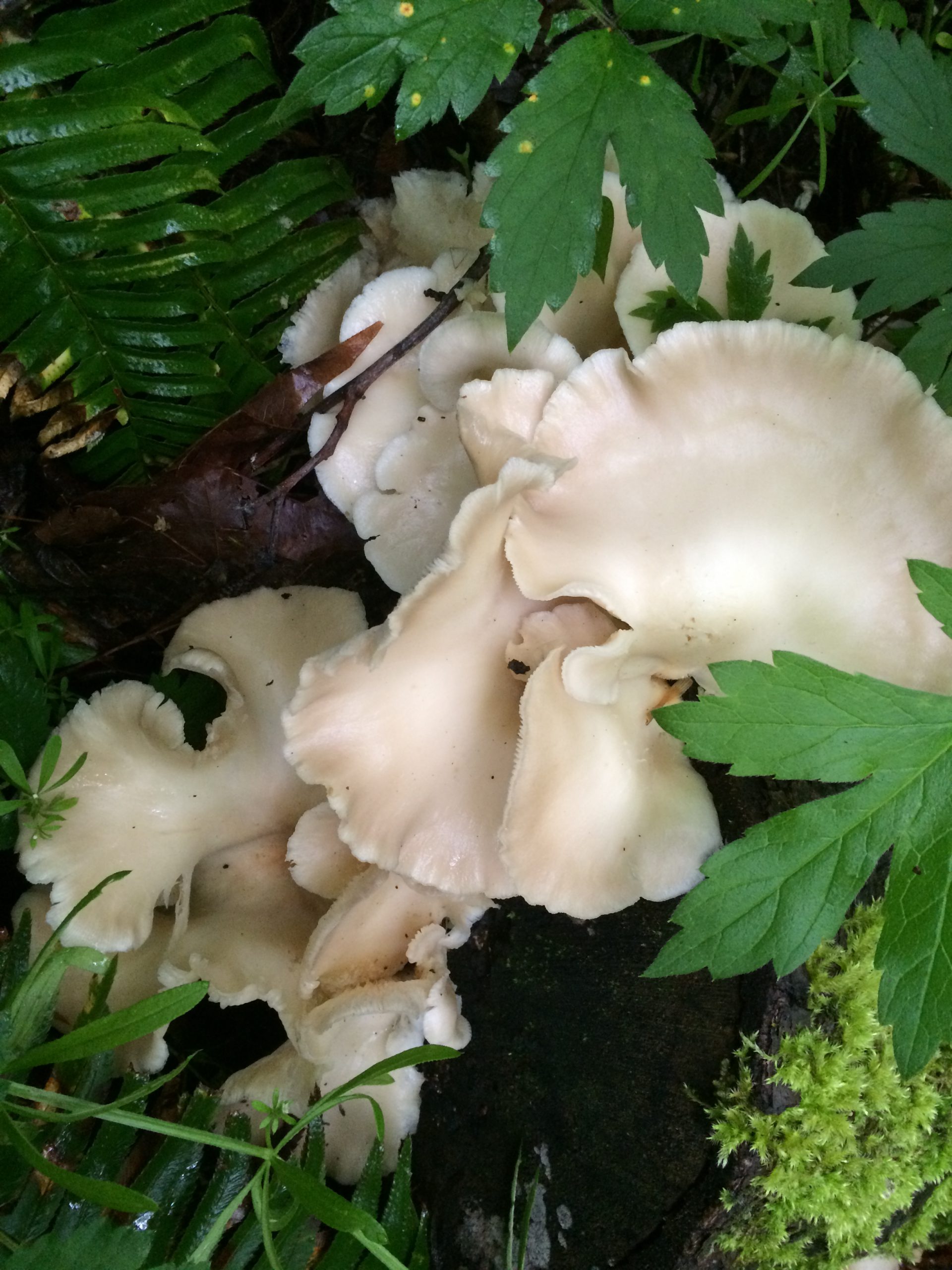
Portland’s Local Chinese Herbal Medicinal Mushroom: the Oyster Mushroom
There’s a mighty mushroom that Chinese herbal medicine has used from ancient times, growing right here in Portland. Most people associate Spring in Portland with blooming azaleas and rhododendrons. This fantastic forest native gets overlooked – the oyster mushroom!
On your next forest hike, take a closer look at dead logs and stumps. You may see a bloom of creamy-white, plate-shaped shelf fungus, as pretty as any Spring blossom. This is Pleurotus, the oyster mushroom, which fruits abundantly in Spring and early Summer in the Portland area. Culinary, medicinal and cleansing, this humble fungus may even be our ally in cleaning up the planet!
If you’re not an expert mushroom hunter, you can enjoy a domesticated version of these delicious fungi in your next stir-fry or plate of scrambled eggs. Oyster mushrooms are easily cultivated and widely available in supermarkets. Here are a few reasons you might want to include them in your menu.
Immune-Boosting, Energy-Boosting, Healthy Aging
Known as ping gu or hao gu in Mandarin, oyster mushrooms have been used in Chinese cuisine and nutritional therapy for centuries. They add a soft, moist texture and a slightly sweet, delicate mild flavor to stir-fry dishes.
Chinese herbal and nutritional therapy classifies foods by “warming” and “cooling” properties according to their effect on the body, as well as by taste. Oyster mushrooms are said to be warm, sweet and pungent. They influence the acupuncture meridians associated with the liver and kidney, and tonify (boost) the yang energy of the body.
In layman’s terms, that means oyster mushrooms are great energy-boosters and immune-boosters. They are also recommended as foods for healthy aging. They may help prevent some common ailments of old age – impotence, coldness hands and feet, weakness, low energy, and low back problems – all of which Chinese medicine associates with a decline in Kidney energy and the Water element.
Many Nutrients, Few Calories
Oyster mushrooms are nutrient-dense and low in calories. They are rich in protein, healthy fats, polysaccharides, Vitamins B-1 and B-2, D, folic acid, niacin, calcium, zinc and trace minerals.
Lowers Cholesterol, Helps with Weight Loss
The multiple health benefits of oyster mushrooms are backed up by some interesting medical research. Pleurotus is well-known for containing a molecule closely related to Lovastatin, a cholesterol-lowering drug. Consumption of oyster mushrooms can accelerate a reduction in cholesterol levels (Stamets 2013). Pleuran, a naturally-occurring Beta-glucan (long-chain sugar molecule) found in oyster mushrooms, assists in fat metabolism and may thereby stimulate weight loss (Rop et. al. 2014).
Anti-Cancer, Anti-Tumor, Anti-Allergic
Pleuran found in oyster mushrooms not only stimulates fat metabolism, it also stimulates the immune system, protects against allergic reactions, and has anti-cancer effects (Rop et. al, 2014). Oyster mushroom extract has also been shown to inhibit proliferation of breast and colon cancer cells and therefore may have a protective therapeutic effect if consumed (Jedinak and Sliva, 2008).
Fight Infections
Oyster mushrooms can also help us fight infections. They kill and eat a variety of bacteria, including E. coli, staph, and salmonella (Stamets 2013). An antibiotic drug was developed from them in the 1950s.
Eat Dirty Diapers, De-Tox the Planet
Imagine lovely white oyster mushrooms blooming on landfill and superfund sites. This could become reality if we enlist this magnificent fungus in cleaning up the environment.
Oyster mushrooms are great decomposers and can quickly break down organic matter. This means they could potentially be used to disintegrate some of the components of a landfill. Researchers in Mexico City have even experimented successfully with using them to eat dirty diapers!
Oyster mushrooms are also good at absorbing heavy metals, especially mercury. They could be used to clean up toxic waste. If you gather them in the wild, be sure to pick from places far from any industrial pollution!
Cooking and Eating
Adding oyster mushrooms to your diet is easy. Just be creative with your favorite recipes. The mild, delicate flavor is a great addition to beef or chicken stir-fry, scrambled eggs or a vegetable side-dish. Coconut oil and olive oil are healthy oils that complement the flavor of oyster mushrooms well.
Oysters, like other mushrooms, should always be lightly cooked and not eaten raw. Many mushrooms contain anti-nutrients, mildly toxic substances which are easily neutralized by a quick fry or sauté. Oyster mushrooms are very moist and contain a lot of water. You may need to sauté them for a few minutes to dry them out, before adding other ingredients to your recipe.



